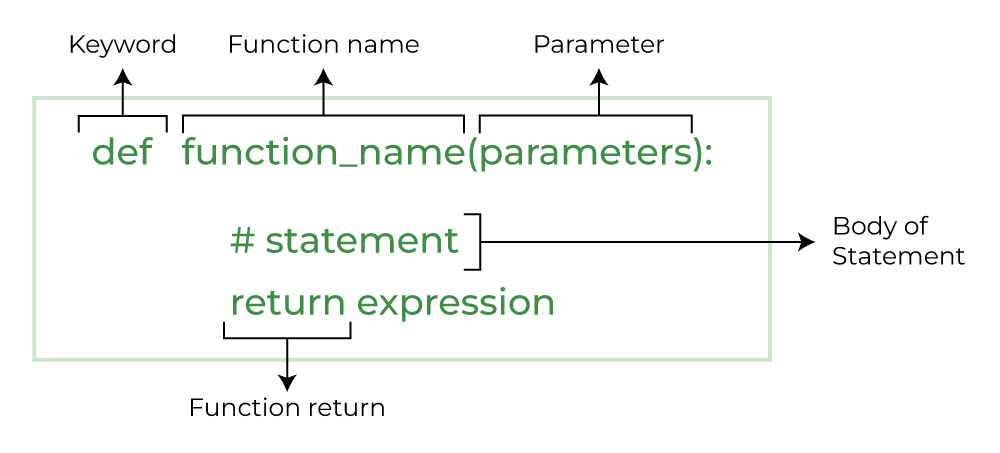Functions in Python - Built-in, Custom, Math, and More
In this post, we will dive into different types of functions in Python, including built-in functions, custom user-defined functions, mathematical functions, and more. We will also explore topics like the return statement, parameters and arguments, global variables, and working with an undefined number of arguments.
Built-in Functions in Python
Python offers a variety of built-in functions that provide ready-made functionalities to perform different operations. These functions are always available and can be used without importing any additional libraries.
Common Built-in Functions
type(object): Returns the type of an object.1 2
num = '70' print(type(num)) # Output: <class 'str'>
str.isnumeric()andstr.isalpha(): Methods of thestrclass.isnumeric()checks if all characters are numeric, andisalpha()checks if all are alphabetic.1 2
print(num.isnumeric()) # Output: True print(num.isalpha()) # Output: False
int(),float(),str(): Convert an argument to an integer, float, or string respectively.1 2 3
print(type(int(num))) # Output: <class 'int'> print(type(float(num))) # Output: <class 'float'> print(type(str(num))) # Output: <class 'str'>
len(sequence): Returns the length of a sequence such as a string, list, or tuple.1 2
my_list = [1, 2, 3, 4, 5] print(len(my_list)) # Output: 5
These built-in functions are extremely useful for manipulating data in Python.
User-defined Functions in Python
User-defined functions allow you to organize and reuse code. These functions are created using the def keyword.
Defining and Calling a Function
1
2
3
4
def greet():
print("Hello from the Python course on GitHub!")
greet() # Calling the function
Functions with Parameters
Functions can also take parameters, which are values you pass to the function when calling it.
1
2
3
4
def personalized_greeting(name):
print(f"Hello, {name}!")
personalized_greeting("Alice") # Output: Hello, Alice!
Functions with Loops
A function can contain any logic, including loops.
1
2
3
4
5
def multiplication_table():
for i in range(1, 11):
print(f"5 * {i} = {5 * i}")
multiplication_table() # Prints the multiplication table for 5
Functions provide a powerful way to organize and reuse code.
Mathematical Functions in Python
Python offers mathematical functions via the math module. To use them, you need to import math.
Common Mathematical Functions
- Constants:
math.pi: The value of (\pi).math.e: The value of (e).
- Trigonometric Functions:
math.sin(x): Returns the sine ofxradians.math.cos(x): Returns the cosine ofxradians.math.tan(x): Returns the tangent ofxradians.
- Logarithmic and Exponential Functions:
math.log(x): Returns the natural logarithm ofx.math.exp(x): Returns (e^x).
- Other Functions:
math.sqrt(x): Returns the square root ofx.math.factorial(x): Returns the factorial ofx.
These functions can help you solve complex mathematical problems efficiently.
The return Statement in Python
The return statement is used within a function to send a result back to where it was called.
1
2
3
4
5
def add_numbers(a, b):
return a + b
result = add_numbers(10, 20)
print(result) # Output: 30
The return statement allows you to pass data back from a function, making it more versatile and useful.
Parameters and Arguments in Python
Parameters and arguments allow you to make your functions flexible by passing in different values each time.
- Parameters: Variables defined in a function’s definition.
- Arguments: Values passed when calling the function.
1
2
3
4
def multiply(x, y):
return x * y
print(multiply(5, 4)) # Output: 20
Parameters (x, y) hold the values passed (5, 4) as arguments.
Global Variables in Python
Global variables are accessible throughout the entire program. These variables are declared outside any function.
1
2
3
4
5
6
7
8
def global_demo():
global a, b
a = 100
b = 200
return a + b
print(global_demo()) # Output: 300
print(a - b) # Output: -100
While global variables can be useful, they should be used with caution to avoid unintended side effects.
Handling an Undefined Number of Arguments
The *args syntax allows you to pass a variable number of positional arguments to a function.
1
2
3
4
5
def display_args(*args):
for arg in args:
print(arg)
display_args(1, 2, 3, 4, 5) # Output: 1, 2, 3, 4, 5
*args collects all positional arguments into a tuple, making the function highly flexible.
Practice Exercises
To help solidify your understanding of functions, try these exercises:
Exercise 1: Factorial Function
Create a function that takes a number as input and returns its factorial.
Exercise 2: Calculator Function
Write a function that takes two numbers and an operator (+, -, *, /) and returns the result of that operation.
Exercise 3: Handling Multiple Arguments
Write a function that takes a variable number of numerical arguments and returns their average.
More Information
Functions are a core component of Python programming, allowing you to write reusable and organized code. Whether you’re dealing with built-in functions, defining your own, or managing complex arguments, mastering functions is essential for becoming an efficient programmer.
For further reading, check out:
Next Steps: In the next post, we will explore Error Handling in Python, covering classes, objects, methods, and inheritance. Stay tuned and keep coding!
